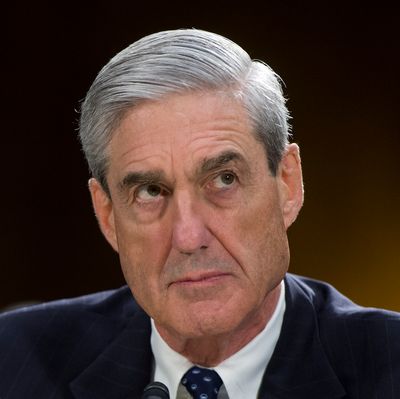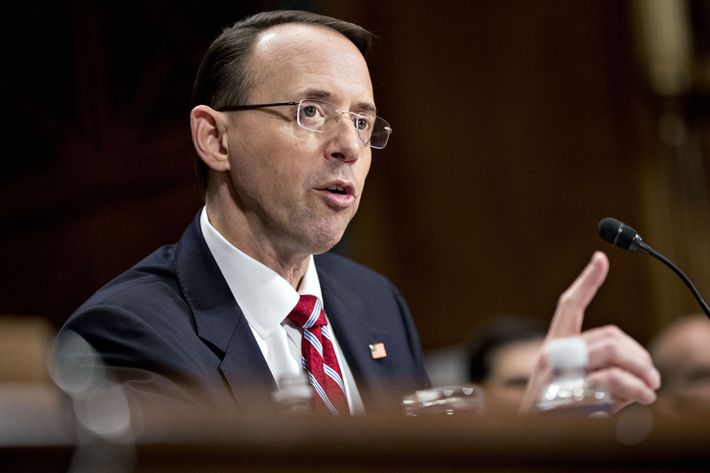
Nine days ago, it seemed unlikely that the Democrats’ frequent calls for an independent investigation into the Trump campaign’s possible ties to Russia would be answered anytime soon. Then President Trump suddenly fired FBI Director James Comey, publicly suggested it had everything to do with the Russia probe, issued a threat on Twitter, and shared classified information with the Russians, among other lesser scandals.
Following Tuesday’s report that Comey has a memo describing a request from Trump to halt the FBI’s investigation into former National Security Adviser Michael Flynn, even Republicans began breaking with Trump. The next day there was a seismic shift in Washington: Deputy Attorney General Rod Rosenstein appointed a special counsel, former FBI director Robert Mueller, to look into Trump’s Russia ties. Here’s a look at what just happened, and what it means for the investigation.
What Is a Special Counsel?
According to Justice Department regulations, the attorney general can appoint a special counsel when they determine “that criminal investigation of a person or matter is warranted” and an investigation by the Justice Department “would present a conflict of interest for the Department or other extraordinary circumstances,” thus “it would be in the public interest to appoint an outside special counsel.”
In this case, the special counsel was appointed by Deputy Attorney General Rod Rosenstein. Attorney General Jeff Sessions recused himself from matters related to the Russia probe following the revelation that he failed to disclose his contacts with Russia’s ambassador to the U.S. during the campaign (though that didn’t prevent him from recommending that Trump fire Comey).
While the terms are sometimes used interchangeably, a special counsel is different from an “independent counsel” or “special prosecutor.” Right after Watergate, Congress passed a law that allowed a three-judge panel to appoint an independent counsel. This led to many headaches for both parties, from the seven-year Iran-Contra investigation to the Lewinsky scandal. When Congress let the law expire in 1999, the Justice Department adopted regulations that allow the attorney general to appoint an outside prosecutor.

What's the Scope of the Investigation?
In his letter appointing Robert Mueller as special counsel, Rosenstein tasked him with looking into “any links and/or coordination between the Russian government and individuals associated with the campaign of President Donald Trump,” as well as “any matters that arose or may arise directly from the investigation.”
How Will the Investigation Be Conducted?
Within the next 60 days, Mueller must come up with a budget proposal, which will be reviewed by Rosenstein. Mueller can request that Justice Department employees be assigned to his team, or ask that outsiders be hired. He’ll likely work with the FBI agents who have been looking into the Russia matter for months.
The special counsel has roughly the same authority as a U.S. attorney, so he can convene grand juries and issue subpoenas. The special counsel can decide whether criminal charges are warranted, and prosecute the case.
Rosenstein noted in a press release that his decision should not be taken as a sign that “crimes have been committed or that any prosecution is warranted.” He said he’s only determined “that based upon the unique circumstances, the public interest requires me to place this investigation under the authority of a person who exercises a degree of independence from the normal chain of command.”
Who Is Robert Mueller?
Mueller is ex-FBI director James Comey’s predecessor, and also his former boss. He ran the bureau from just before the September 11, 2001, terrorist attack to September 4, 2013. Obama asked Mueller to stay on for two years beyond the FBI director’s usual ten-year term, making him the second longest-serving FBI chief after J. Edgar Hoover.
Though Mueller was appointed by President George W. Bush, in one of the most dramatic incidents from his tenure at the FBI, he fought the administration over its warrantless wiretapping program — coincidentally, along with Comey. Per CNN:
Comey was serving as acting attorney general as then-Attorney General John Ashcroft was hospitalized. Comey refused to reauthorize the controversial Bush administration program over concerns about the legality of the surveillance.
The White House counsel and chief of staff rushed to the hospital to attempt to get Ashcroft to sign the reauthorization – and Comey rushed to stop them, though the program was eventually reauthorized without Justice Department approval. Mueller’s notes backed up Comey’s account when the incident was revealed three years later, and Mueller joined Comey in threatening to resign in 2004 if the program was not overhauled.
How Did Members of Congress React?
Democrats, who have been calling for a special prosecutor for months, were elated. In a sign of how much a week of daily controversies shifted the GOP’s stance, Republicans were pleased with the appointment of a special counsel as well. “My priority has been to ensure thorough and independent investigations are allowed to follow the facts wherever they may lead,” House Speaker Paul Ryan said in a statement.
It helped tremendously that Mueller is widely respected among members of both parties, and has “impeccable credentials,” as House Oversight Committee chairman Jason Chaffetz put it.
“By having someone like Bob Mueller head the investigation assures the American people that there’s no undue influence, be it here or be it at the other end of Pennsylvania Avenue, or within the Justice Department or FBI,” said Senate Intelligence Committee Chairman Richard Burr, who had previously opposed appointing a special counsel.
How Did Trump React?
The White House had no advance notice that Rosenstein was appointing a special counsel, and Politico reported that he took the news shockingly well. A source said his reaction was “extremely measured,” and he didn’t scream or yell.
Staffers rallied around the president, and while the source said they understood it wasn’t good news, there was some relief that they now have an answer to questions about the Russia matter — “that we just can’t talk about,” one aide said.
Julian Epstein, who was chief counsel for Democrats on the House Judiciary Committee during Bill Clinton’s impeachment proceedings, suggested Trump officials are being too optimistic. “With the appointment of Mueller, they have now totally lost control of this train and have very limited ability to manage the widening crisis around it,” Epstein told the New York Times. “This will go down as one of the most inept and counterproductive efforts of damage control that we’ve ever seen in public life.”
Trump issued this statement on Wednesday night:
It seems less likely that Trump will follow that up with an early-morning tweet storm. “I think he actually understands what a mess this is,” one person told Politico. “He has lawyers telling him nonstop what the stakes are here.”
How Much Independence Does Mueller Have?
Justice Department regulations state that “the special counsel shall not be subject to the day-to-day supervision of any official of the department.” However, the attorney general (or in this case Rosenstein) can block major investigative steps if they determine that the action “is so inappropriate or unwarranted under established departmental practices that it should not be pursued.” If that happens, Rosenstein must explain his decision to Congress.
Rosenstein can fire Mueller for “for misconduct, dereliction of duty, incapacity, conflict of interest, or for other good cause.” As Politico notes, Trump could also try to reenact Nixon’s Saturday Night Massacre:
Trump can’t fire Mueller directly, but in theory could order Rosenstein to dismiss Mueller and could fire Rosenstein if he didn’t comply. The president could then seek out someone who would dismiss the special prosecutor.
Another outrageous scenario: Trump could direct Sessions to repeal the Justice Department regulation that allows for the appointment of a special counsel.
How Long Will the Investigation Take?
The controversy following Trump’s firing of Comey has moved incredibly fast, and some pundits have left the impression that we’re just weeks away from impeachment proceedings. Appointing a special counsel should slow down the process considerably, which is part of the reason congressional Republicans embraced the development.
“I think it takes the issue off the table for the time being,” Republican Representative Ryan Costello told reporters on Wednesday night. “We’re trying to separate fact from fiction and we’re getting asked by all of you, respectfully, ‘Should an independent commission be established?’ ‘What about an independent prosecutor?’”
“It’s one less question that we have to answer about an extremely confounding and contentious issue that a lot of people are politicizing,” Costello added.
The next few weeks should be slow, as Mueller assembles his team, draws up a budget, and reviews the investigation’s progress so far.
According to a Washington Post analysis, the investigation is likely to take years, though there can be indictments and prosecutions before its official conclusion. The paper notes that while the Whitewater investigation led to Bill Clinton’s 1999 impeachment trial, it didn’t technically end until 2002.
How Does It End?
Under Justice Department rules, Mueller is required to present Rosenstein with a confidential report explaining his decision on whether or not to prosecute. Rosenstein can release the report if he thinks it will be in the public interest, but he doesn’t have to.
Several days ago, The Atlantic’s David Frum argued that those concerned about Trump’s Russia ties should be pushing for a select committee of Congress or an independent commission rather than a special counsel narrowly focused on criminal wrongdoing:
Few now disagree that the integrity of the 2016 election was polluted by clandestine foreign intervention. Americans deserve the full story of that pollution, If the president of the United States—or anyone near him—is compromised by connections to foreign intelligence or foreign organized crime, the public and Congress need to know that immediately. But the dangers—and the remedies—in the present situation are much more likely to be political than legal. It’s more important that the investigation be speedy and its full conclusions shared with the public than that it lead to indictments, prosecutions, and penalties. By delaying, distracting, and asking the wrong questions, a slow-moving and tight-lipped special prosecutor could well serve Trump’s interests better than Trump’s own lawyers to date have done.
What Happens to the Other Russia Probes?
Mueller will likely have control over what information is shared with Congress, and lawmakers are usually wary of interfering in an ongoing investigation. But Republicans and Democrats leading various probes into Trump and Russia said they intend to continue their work.
“The appointment of a special counsel is not a substitute for a vigorous investigation in Congress and the House Intelligence Committee will take steps to make sure our investigations do not conflict and ensure the success of both efforts,” said Representative Adam Schiff, the ranking Democrat on the House Intelligence Committee. “We will also want to make certain that the special counsel has all the resources it needs to undertake this important task.”






























